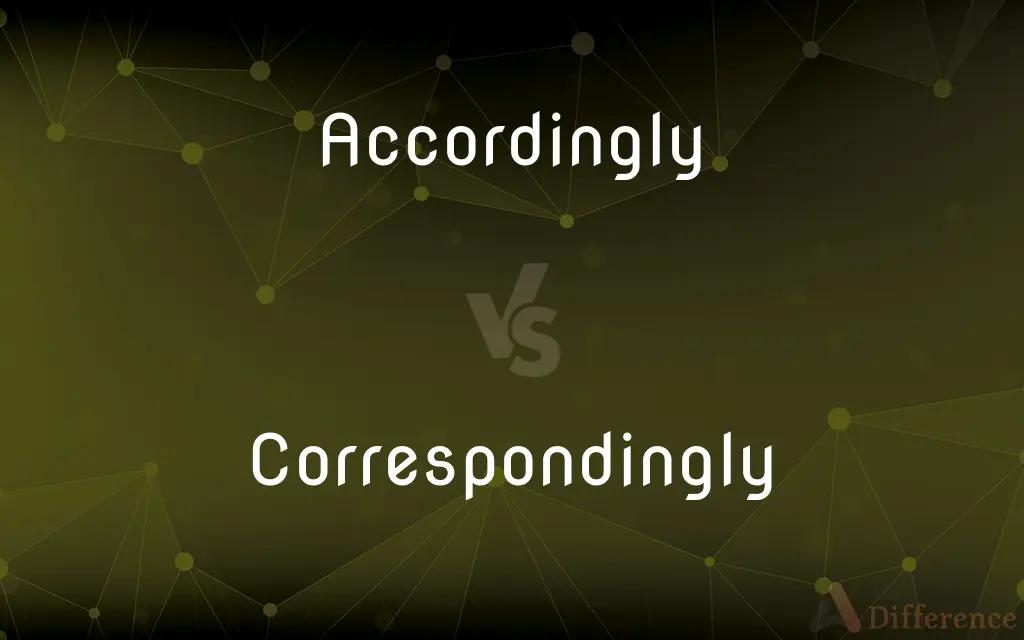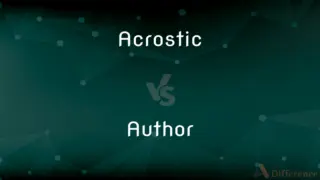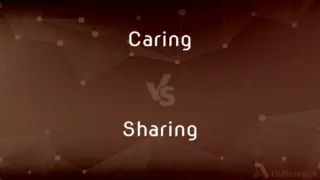Accordingly vs. Correspondingly — What's the Difference?
By Urooj Arif & Fiza Rafique — Updated on March 27, 2024
Accordingly signifies actions in agreement with preceding information, while correspondingly denotes parallel changes or similarities.

Difference Between Accordingly and Correspondingly
Table of Contents
ADVERTISEMENT
Key Differences
Accordingly refers to actions or conclusions drawn based on what was previously stated or understood. On the other hand, correspondingly is used to indicate a direct correlation or equivalence between two sets of information, situations, or changes.
While "accordingly" often introduces a conclusion or a course of action that logically follows from the preceding context, correspondingly highlights equivalence or similarity between two scenarios or sets of data. This difference is crucial in academic, professional, and everyday contexts to convey the right connection between ideas or facts.
Accordingly can also suggest a manner of doing something that is suitable or appropriate to the circumstances. It is about adjustment or action that is deemed fitting based on the conditions or facts at hand. Correspondingly, in contrast, is less about adjustment and more about illustrating a mirror-like relationship. It's about showing how one aspect directly mirrors or matches another in proportion, intensity, or kind.
Comparison Chart
Primary Usage
To indicate actions in alignment with something
To denote parallel changes or similarities
Context
Often follows advice, rules, or conditions
Used when comparing related aspects
ADVERTISEMENT
Implication
Adjustment or adaptation
Similarity or equivalence
Example Sentence
"The weather was cold, so she dressed accordingly."
"As the demand increased, the prices rose correspondingly."
Key Difference
Response to a situation or information
Illustration of parallel or equivalent changes
Compare with Definitions
Accordingly
In accordance with.
He arranged his books accordingly by genre and author.
Correspondingly
Indicating a direct correlation between two variables.
The demand for electric cars has surged, and correspondingly, the investment in charging infrastructure has grown.
Accordingly
In a way that is appropriate to the particular circumstances.
After the warning, they acted accordingly to avoid any danger.
Correspondingly
To a corresponding degree or extent.
As the workload decreased, the staff's stress levels dropped correspondingly.
Accordingly
To correspond or agree with something.
She adjusted the settings accordingly to the manual's instructions.
Correspondingly
Matching or analogous in character or function.
The two systems operate differently but achieve correspondingly effective results.
Accordingly
Therefore, as a consequence.
The contract was breached, and accordingly, compensation was sought.
Correspondingly
In a way that corresponds to something else.
The budget increased and, correspondingly, so did the scope of the project.
Accordingly
Following or in consequence of a previously mentioned action.
The instructions were clear, and the team executed the plan accordingly.
Correspondingly
Equivalently or similarly in comparison.
Their achievements are remarkable and, correspondingly, well-recognized.
Accordingly
In accordance; correspondingly.
Correspondingly
Having the same or nearly the same relationship.
Accordingly
So; consequently.
Correspondingly
Accompanying another
A high corporate position and its corresponding problems.
Accordingly
(manner) Agreeably; correspondingly; suitably
He was absent when I called, and I accordingly left my card.
Correspondingly
Having been assigned the responsibility of written communications
A corresponding secretary.
Accordingly
(conjunctive) In natural sequence; consequently; so.
Our preparations were all finished. Accordingly, we set sail.
Correspondingly
Participating at a distance from the rest of a group
A corresponding member of the bar association.
Accordingly
Agreeably; correspondingly; suitably; in a manner conformable.
Behold, and so proceed accordingly.
Correspondingly
In a corresponding manner; conformably.
He lived in a huge mansion, with a correspondingly large set of gates to keep out unwanted guests.
Accordingly
In natural sequence; consequently; so.
Correspondingly
In a corresponding manner; conformably.
Accordingly
(sentence connectors) because of the reason given;
Consequently, he didn't do it
Continued to have severe headaches and accordingly returned to the doctor
Correspondingly
In a corresponding manner;
The temperature decreases correspondingly
Accordingly
In accordance with;
She acted accordingly
Common Curiosities
Can correspondingly and accordingly be used interchangeably?
While they may seem similar, they are not interchangeable. "Accordingly" relates to actions taken in response to something, while "correspondingly" refers to parallel changes or similarities.
What does it mean to act accordingly?
Acting accordingly means to behave or respond in a manner that is appropriate to the given circumstances or information.
How do I use accordingly in a sentence?
"The forecast predicted rain, so she packed an umbrella accordingly."
What distinguishes accordingly from correspondingly?
"Accordingly" suggests adaptation or action in response to something, whereas "correspondingly" highlights similarity or parallel changes.
What role does correspondingly play in data presentation?
It is crucial for illustrating correlations or direct relationships between data sets in a clear and concise manner.
What is an example of using correspondingly in a sentence?
"As the quality of smartphones improves, the prices increase correspondingly."
Is accordingly only used for actions based on advice?
No, accordingly can be used for actions based on any preceding information or conditions, not just advice.
Why is it important to distinguish between accordingly and correspondingly?
Understanding the distinction enhances precision in communication, ensuring that the intended relationship between ideas or facts is accurately conveyed.
Does correspondingly imply causation?
Not necessarily. It indicates a correlation or parallel between two aspects but does not directly imply one causes the other.
Can I use accordingly at the beginning of a sentence?
Yes, you can use accordingly to start a sentence when drawing a conclusion or indicating a consequent action.
Is correspondingly formal language?
Yes, it is often used in formal contexts to describe parallel changes or equivalences.
Can accordingly imply causality?
It can imply causality in the sense that it shows actions or decisions are made as a result of certain information or conditions.
Is accordingly used in academic writing?
Yes, it is commonly used in academic writing to show a logical progression or conclusion.
How does correspondingly enhance clarity in writing?
It clearly indicates a proportional or direct relationship between two sets of information, enhancing the reader's understanding of the comparison.
Can correspondingly be used to compare two different things?
Yes, it is used to show how two different things vary in a related or parallel manner.
Share Your Discovery

Previous Comparison
Acrostic vs. Author
Next Comparison
Caring vs. SharingAuthor Spotlight
Written by
Urooj ArifUrooj is a skilled content writer at Ask Difference, known for her exceptional ability to simplify complex topics into engaging and informative content. With a passion for research and a flair for clear, concise writing, she consistently delivers articles that resonate with our diverse audience.
Co-written by
Fiza RafiqueFiza Rafique is a skilled content writer at AskDifference.com, where she meticulously refines and enhances written pieces. Drawing from her vast editorial expertise, Fiza ensures clarity, accuracy, and precision in every article. Passionate about language, she continually seeks to elevate the quality of content for readers worldwide.















































